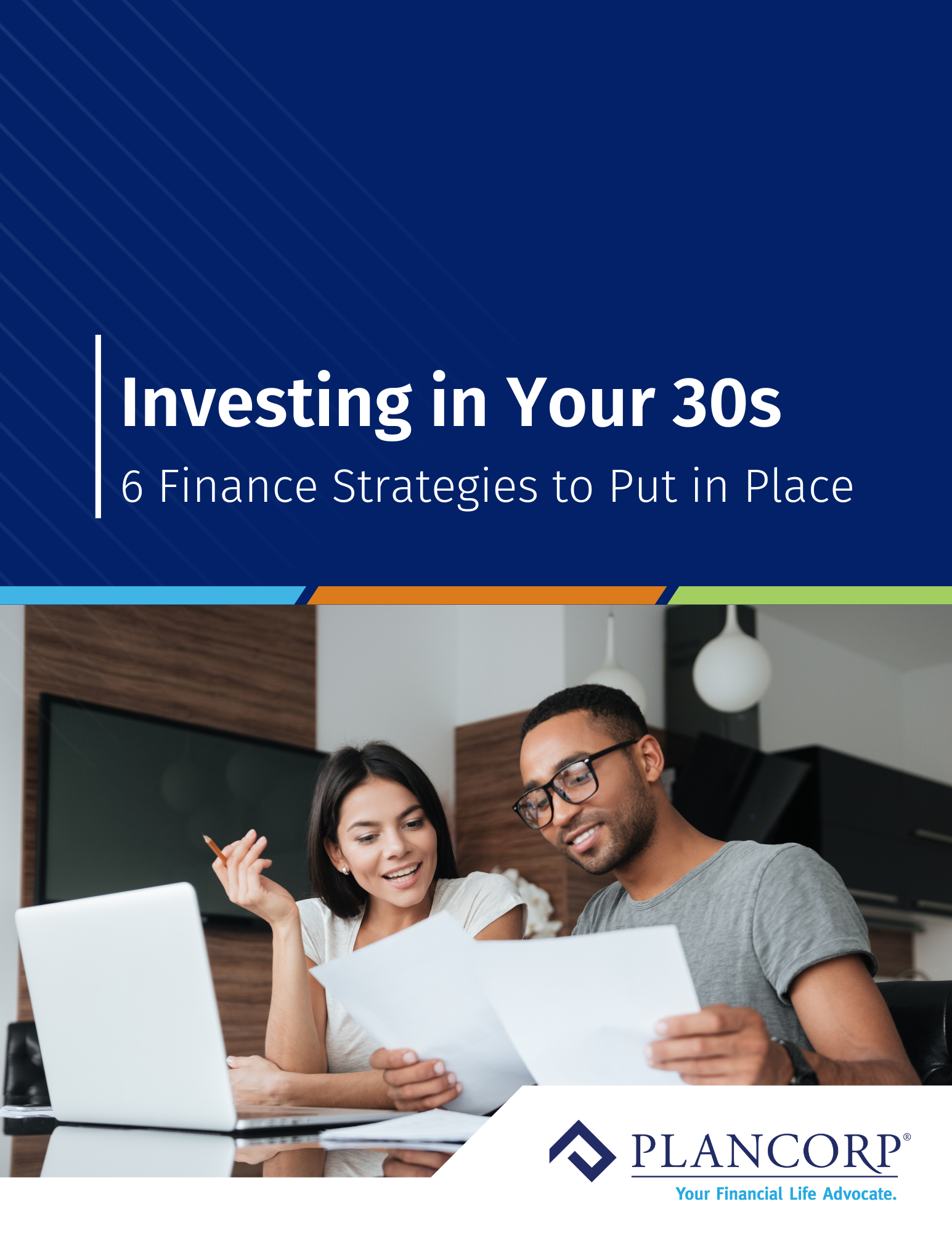Investing in Your 30s: 6 Finance Strategies to Put in Place
Your 30s are a pivotal time to make moves that will build a comfortable financial future and a substantial nest egg once you reach retirement age. By now, the worries of graduating and starting a career are often replaced by buying a home, marriage, or raising kids.
According to the U.S. Census Bureau, the median age for first marriages is 30 for men and 28 for women. The National Association of Realtors reports the median age for first-time homebuyers is 35. That’s a lot of new responsibilities and costs to think about when planning for the future.
Your 30s are the time to begin building lasting wealth to meet life’s growing demands. Here are six ways to focus your investing strategy as you navigate your 30s.
1. Consolidate Your Investments
By your 30s, you’ve likely accumulated multiple accounts from different employers—old 401(k)s, IRAs or brokerage accounts. Consolidating these accounts where appropriate simplifies your financial life and strengthens your investment portfolio. Benefits include:
- Improved visibility into your full financial picture: When your investments are spread across multiple platforms, it’s hard to understand your true asset allocation and risk exposure, as well as your progress toward investment goals.
- Potentially reduced fees and taxes: Some old investment accounts could carry high administrative or fund fees that erode returns over time. Moving assets into lower-cost accounts can save significant money. Fewer accounts can also simplify your distributions down the road in retirement, potentially reducing your tax burden
- Easier management if someone else needs to step in: If something happens to you, or you simply want to hire a financial advisor as a second set of eyes, it’s far easier for your family or advisor to manage and access consolidated accounts rather than tracking down scattered holdings.
- Greater flexibility for your investment strategy: Managing accounts together can allow for better tax optimization, more effective rebalancing, and easier implementation of an overall asset allocation plan aligned with your long-term investment goals and risk tolerance. If you make a change to your risk tolerance, you want to implement that quickly, not have to log in and log changes to multiple accounts.
Before consolidating, review each account’s investment options, fees, and potential tax implications. A financial advisor can help ensure you don’t inadvertently trigger taxable events and can recommend the most efficient structure.
2. Get Strategic with Your Debt
If you have debt, the strategies you put in place in your 30s can shape how quickly you can pay it off. There’s no precise formula for getting out of debt quickly, and your unique financial situation will dictate your exact priorities, but the debt avalanche is one preferred method.
Use the debt avalanche method to pay down liabilities with the highest interest rates first:
- High-interest debt that is non-deductible (e.g., credit card debt)
- Debt with private mortgage insurance
- High-interest, tax-deductible debt (e.g., some student or business loans)
- Low-interest, tax-deductible debt (e.g., mortgages or certain student loans under ~4%)
Whichever method you choose, it’s critical to get as much of this debt behind you as possible at this stage in life so it doesn’t impact your long-term goals. Should you invest first or pay off debt first? You likely don’t need to wait to invest while paying down debt. If your expected investment returns exceed your interest costs, you’re often better off doing both concurrently, especially if you’re getting employer matches or other incentives.
Read Blog
Read our Invest or Pay Down Debt? blog where you'll learn the most common variables to examine when it comes to making your decision.
3. Maximize Your Retirement Accounts
There are so many options for retirement savings, and choosing the “best investment” for your time horizon can feel daunting. In general, you should prioritize accounts with employer benefits and tax advantages before investing in others.
Maximize your retirement investments in this order:
- Invest the amount necessary to get a full employer match on your company retirement plan. Employer contributions can vary widely so it’s important to ask your employer questions to fully understand your savings plan.
- Contribute to a Roth IRA or deductible traditional IRA, if you’re eligible, which grows tax-free. Roth IRAs give you major tax benefits later on in life because it’s funded with after-tax dollars, making it non-deductible. If you suspect you’ll pay low taxes in the future, a traditional IRA works well.
- Invest the maximum limit on your company 401(k). 401(k)s generally have high contribution limits. Even if you start small with your 401(k), you can work your way up to the highest limit.
- Contribute to a traditional nondeductible IRA, which you make contributions to with pre-tax income and ultimately offers tax-deferred compound growth.
If you’ve accomplished the above and still have more available to invest, don’t forget about your Health Savings Account (HSA). This account offers a triple tax benefit: a tax deduction on the contribution, tax-free investment growth and tax-free withdrawals when used to pay for medical expenses.
4. Make the Most of Your Cash
Investing while covering day-to-day expenses can be a delicate dance, especially at a stage in life where financial responsibilities seem to multiply. The trick is figuring out how much you can put away while still having enough liquid cash on hand to meet immediate needs. Here are some general recommendations:
- Maintain a cash buffer of 25–50% of monthly expenses in checking for irregular costs.
- Keep 3–6 months of expenses in an emergency fund, preferably in a high-yield online savings account to earn ~4–5% APY.
- Avoid holding excessive cash, as it underperforms inflation over time. Invest excess reserves to build your long-term wealth.
5. Plan for the Unexpected
Over the course of your life, you and your family are bound to face some unplanned—even unpleasant—moments. Some of these can be financially crippling if you’re unprepared.
It starts with proper insurance coverage. Nearly everyone with a spouse, partner, or child needs life insurance, and you are better off choosing term life insurance rather than a permanent life insurance policy.
Term life insurance is a type of life insurance policy that covers a specified “term” of years. It’s typically much less expensive than permanent life insurance, which is an umbrella term for any life insurance policy that does not expire (often called whole life insurance).
You also need some form of disability insurance to protect you from an accident or illness that takes away your ability to work. It’s not morbid or alarmist, it’s just factual that when you’re in your 30s, you’re far more likely to become disabled than pass away. Losing your primary income stream, even just for a few months, can massively dent your long-term financial plan.
The final step in preparing for the unexpected is developing an estate plan to protect you, your family, and your assets. An estate plan allows you to manage and preserve your assets while you’re alive and ensure the distribution of your assets is done to your wishes after death.
If you have minor children, an estate plan is especially important beyond monetary reasons because it allows you to name the kids’ guardian in the event of your death—otherwise the decision is up to the state. Set and regularly revise your stated beneficiaries and other estate plan needs as your life changes.
Free Guide
Download our Estate Planning Guide guide for a crash course in everything you need to know to protect your family and your legacy.
6. Get Assistance
Research by Vanguard shows that working with a financial advisor can add about 3% net annual value through behavioral coaching, tax planning, and optimized investment strategies.
Choosing an advisor that provides comprehensive financial planning —not just investment advice—can get your entire financial house in order and keep it that way forever. These financial professionals can proactively assist with:
- Investment management
- Tax projections
- Estate planning
- Insurance analysis
- Retirement income strategies
Perhaps most important of all, hiring a professional frees you up to do the things you love most in life and alleviates the stress that can come from managing your financial matters.
Download the PDF Version of this Page

Did you find the information on this page helpful? Access the free downloadable version of this page below.
Much like our advice to folks in their 20’s, the key is starting now if you haven’t already. Your 30s set the stage for future financial security, and start to dictate whether you’re financially resilient enough to grow or a short-term roadblock will knock you off track for years to come. Implement these strategies today to build wealth with confidence and purpose.
Next Steps
If you’re ready to start making smart decisions with your money, explore these resources:
- Take our 2-Minute Financial Analysis for a gut-check on how you’re doing in four key areas of your financial plan. We’ll give you instant scores to help pinpoint your biggest opportunities.
- Download our free net worth worksheet to understand your full financial picture and feel confident in the next right money move.






